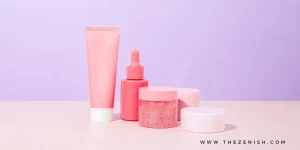What causes hormonal acne? Hormonal acne, also known as acne vulgaris, is a condition caused by the body’s hormone levels fluctuating.
It’s typically linked to puberty but can happen with adults of any age, especially women.

This is due to various factors, like the menstrual cycle, pregnancy and menopause.
Androgens can also be a trigger for hormonal acne.
Androgens are the male sex hormones, such as testosterone and DHT (dihydrotestosterone).
Dihydrotestosterone DHT is the most potent androgen in the body. DHT is mainly manufactured by 5 alpha-reductase which converts testosterone to dihydrotestosterone.
They can stimulate oil glands in your skin, which is what causes acne.
The increased activity of androgen hormones can trigger a process of creating more sebum, causing skin cells to change, stimulating inflammation and also providing a home for the P. acnes bacteria which leads to breakouts.
| this post may contain affiliate links, which means if you purchase from one of these links, I may receive a small commission at no additional cost to you. |
How do I know if my acne is hormonal?
Here are 5 signs your breakouts are hormone-related. It’s probably hormonal acne if:
1. you’ve passed puberty
The reality is that acne can and does happen at any time.
However, hormonal acne is most likely to appear in your 20s because those are the years you’re most hormonally active.
Your 20s are often the peak child-bearing years making you more prone to hormonal changes.
These can intensify during pregnancy, childbirth and breastfeeding, but genetics can also play a part in when hormonal breakouts start and stop.
2. you breakout around your chin and jawline.
One of the first signs of hormonal acne is where it is on the face.
If you’re noticing bumps on your chin and jawline, as well as other areas on your lower face it might be hormonal acne.
This type of acne is more common in women than men, but the reason why isn’t exactly known. Over-producing oil is suspected to play a role.
This is because your body’s hormones are stimulating the oil glands located on your chin. This causes the release of excess oil which builds up and causes blackheads.
Although the chin and jawline are the most common places for hormonal acne, they can also appear on your cheek and along your neck.
3. you breakout at specific times of the month.
Hormonal acne often cycles like your menstrual cycles, because female hormones often influence blemishes even after menopause. They tend to pop up in the same place each month as well.
Hormonal breakouts usually occur on the same spot on the skin each month. This is usually because a pre-existing pimple enlarged one particular pore.
But it could also be that the pore opening becomes clogged with oil or sweat, trapping it there but this can vary from person to person.
4. you’re stressed
Cortisol, the hormone released when someone is under stress, can affect all of your other hormones and make them not work as well.
Women who are prone to monthly hormonal fluctuations and have periods of acute stress can and are more likely to experience hormonal acne flare-ups due to the cortisol in their bodies.
If you’re prone to monthly hormonal fluctuations and find yourself in an extremely stressful situation, take some time out of your day to take care of yourself.
This means practicing self-care like exercising, meditating, or reading a good book to reduce stress and improve your mood.
5. you breakout in painful cysts
Hormonal acne can show up in the form of painful cysts, unlife blackheads and whiteheads.
These painful cysts are deeper bumps under the skin that are hard to extract with normal manual extraction by an individual or an esthetician.
These bumps are usually tender to the touch because they’ve collected an excess of oil over days or weeks which then causes an inflammatory reaction and likely pop up in the same spot more than once.
This is known as chronic inflammation.
This type of acne requires a more clinical approach to treatment that starts from the inside out rather than treating them topically.
3 Effective Ways to Treat Hormonal Acne
1. OTC treatments
Topical treatments are the first line of defence for acne. They’re the most popular and effective for mild cases.
A dermatologist may prescribe or recommend over-the-counter treatments with ingredients like:
- Retinoids
- Benzoyl Peroxide
- Azelaic Acid
- Salicylic Acid
- Glycolic Acid
Topical retinoids
Most dermatologists will start by prescribing topical retinoids for mild to moderate acne, especially for cases of hormonal acne.
Retinoids will make your skin gradually slough off dead skin cells at a more normal pace.
They are the preferred procedure for long-term treatment due to their limited severe side effects and they prevent future breakouts.
Note: When you first start using Retinoid or other prescription acne medication, your skin may be more sensitive than normal.
You may see some dry, red patches for instance.
So let your dermatologist know how you react to the treatment and follow their advice (they may suggest starting by just applying the medication a few times a day)
And if you have particularly sensitive skin (or a skin condition like rosacea), retinoids might be too strong and lead to more breakouts.
You should also avoid them if you’re pregnant and consult with a dermatologist for the best advice for your unique situation and skin type.
Product picks:
- Differin Acne Treatment Gel
- La Roche-Posay Pure Retinol Face Serum with Vitamin B3
- Paula’s Choice BOOST 1% Retinol Booster
Benzol peroxide
One of the best topical medicine for acne is benzoyl peroxide. Its antimicrobial ingredients not only get rid of cause pimples but also help prevent future breakouts.
For best results, use benzoyl peroxide in concentrations ranging from 2.5 to 10%. It also works best when left on the skin in the form of a serum or lightweight moisturizer.
Product picks:
- Paula’s Choice CLEAR Extra Strength Skin Clearing Treatment | 5% Benzoyl Peroxide
- CeraVe Acne Foaming Cream Cleanser | 4% Benzoyl Peroxide
- Acne.org 8 oz. Treatment 2.5% Benzoyl Peroxide
Salicylic acid
The best concentration of salicylic acid in an over-the-counter product is around 2%. Products with this amount can unclog pores and reduce inflammation.
Product Picks:
- The Ordinary Salicylic Acid 2% Masque
- Paula’s Choice Skin Perfecting 2% BHA
- The Inkey List Beta Hydroxy Acid
Glycolic acid
Product picks:
Azelaic Acid
Product picks:
- The Ordinary Azelaic Acid Suspension 10% 30ml
- Paula’s Choice BOOST 10% Azelaic Acid Booster Cream Gel
2. Birth control
Birth control pills can help regulate hormones, decrease testosterone levels and prevent hormonal breakouts. Some are also approved by the FDA for the treatment of acne.
If you’re already using or thinking about using birth control speak with your doctor to see if he or she recommends it to help stabilize your hormones and treat hormonal acne.
3. Isotretinoin
Isotretinoin (also known as Accutane) is a much stronger form of medication against acne. It’s an oral vitamin A that reduces the amount of oil released by skin glands, helps breakouts heal faster, and reduces the chances of scarring. People often turn to isotretinoin to treat severe acne.
This medication is usually prescribed after other acne treatments have failed.
Isotretinoin isn’t the first solution but can be quite effective when other remedies don’t work.
Your doctor will ask if you’re pregnant or trying to conceive before writing you a prescription for isotretinoin because it can cause birth defects. However, taking isotretinoin, in general, will not affect your child-bearing potential for the future.
Hormonal acne can be bothersome but you don’t have to live with it. Work with your dermatologist to find a solution, which may involve a combination of over-the-counter and prescription treatments.
What causes hormonal acne: 8 Lifestyle Changes and Natural Treatments for Hormonal Acne
Changing your lifestyle habits can’t fix severe acne cases. However, making some lifestyle and habit changes can reduce moderate acne caused by hormones. You can:
- avoid touching, scratching or picking your pimples. This only helps bacteria get in and spread further, contributing to an already inflamed and infected area.
- don’t wash your face more than two times daily unless you need to, as excessive washing can irritate your skin and lead to breakouts
- skip harsh face washes. Unfortunately, many over-the-counter face washes are full of chemicals that irritate the skin and further destroy the skin barrier. When you have breakouts, it’s best to avoid harsh exfoliating face washes and other harsh skincare products
- skip makeup when you can. During severe and inflammed breakouts avoid using makeup that isn’t water-based. Or try to only wear makeup when you really need it
- avoid excessive sweating on hot days and always shower right after workouts. This reduces the amout of time your skin is exposed to sweat and bacteria which can lead to worse breakouts
- drinking 2-3 cups of green or black tea a day, for several days in a row, may help with hormonal acne. Studies show that green and black tea may both have mild anti-inflammatory properties
- consider using a face mask. Anti-acne masks with alpha hydroxy acids can greatly improvemen your skin’s health. A single mask won’t be enough to clear up your acne, but regular use could make your skin healthier and more resilient
- eat more antioxidant-rich foods. Not eating a sufficient amount makes inflammation worse, possibly worsening hormonal acne outbreaks. Plant bassed foods rich in natural antioxidants can help decrease your severity of your breakouts to a certain extent
5 Ways to Prevent Hormonal Acne without Medication
Once you have treated the root cause of your acne, you may start looking into how to prevent it from coming back.
It’s not possible to get rid of acne-causing hormones without disrupting essential body functions, like the menstrual cycle.
However, it is possible to establish a consistent skincare routine to prevent severe breakouts.
Luckily, most of the treatments for hormonal acne can also be used as preventive measures:
- use a gentle cleanser. Apply a non-comedogenic cleanser every day to clear away dead skin cells and excess oil from your pores. This will help keep acne at bay, keeping your face free of breakouts while controlling the production of sebum. The Ordinary Squalane Cleanser, La Roche Posay Toleriane Hydrating Gentle Cleanser and The Ordinary Squalane Cleanser are all great options
- avoid using too many products. Products with helpful ingredients like benzoyl peroxide and salicylic acid work well for acne, but using too many products or changing products too often can have a negative effect on your skin. Instead stick with one routine for a couple of months to give the products a fair chance of working
- don’t forget to moisturize. using a moisturizer consistently an actually help prevent acne from developing! This may sound counterintuitive if you have oily skin, but it’s a common misconception that oily skin needs to be dried out
- protect your skin by using sunscreen. While it has no impact on hormones, it’s crucial for good skin health. Wear a broad-spectrum, water-resistant protection with an SPF of 30 or greater during the day while you’re out in the sun. Give either of these a try ECLIPSE Sheer Mineral Sunscreen, PURITO Comfy Water Sun Block or Big Apple Sun Cream SPF 50
- Make sure to see a dermatologist. Just like it’s important to see your doctor for annual checkups, seeing a dermatologist can help with serious or chronic breakouts, and he or she can help you choose the best products for your needs



